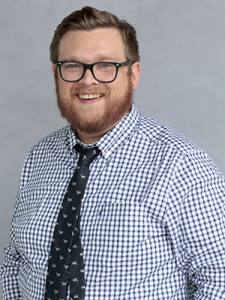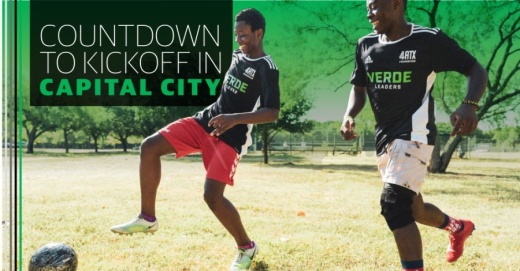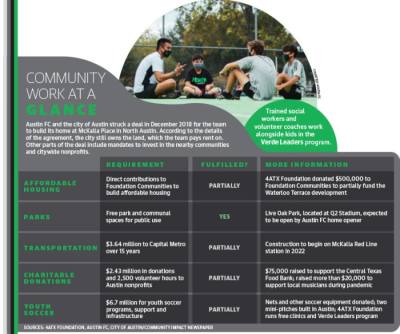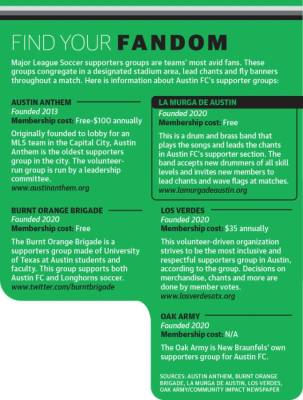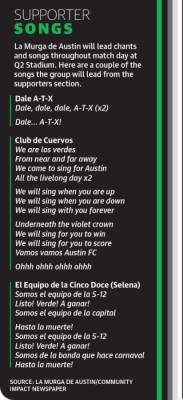In that time, 4ATX Foundation, which was sprung by a $1 million donation from Austin FC owner Anthony Precourt, has already made connections with thousands of kids citywide through youth soccer programs, field rehabilitation and leadership programs, according to Kaitlin Swarts, Austin FC’s vice president of community impact.
“It was a huge signal to the city of Austin that Austin FC is a club committed to the community. Two years before we play our first game, we’re creating this nonprofit arm that will act as a catalyst of change within the city,” Swarts said.
According to the professional soccer club, 4ATX has invested more than half a million dollars into Austin and its surrounding communities.
Much of the investment has been directed to 4ATX’s Verde Leaders program, a product of Swarts’ invention.
The Verde Leaders program, Swarts said, is designed to foster and develop leadership qualities in Austin’s youth. Kids who sign up for the program develop soccer skills along with life skills like communication, academic focus and conflict resolution through after school training and in-school support. Trained social workers and soccer coaches alike serve as leaders for the program, which was faced with radical adjustments after the onset of the coronavirus, Swarts said.
Because in-person training and support became impossible throughout much of the year, the Verde Leaders program developed a virtual program and brought materials to the doorsteps of kids across Austin.
In order to facilitate its participants, 4ATX donated approximately 2,000 soccer balls across the city.
“Kids were participating in the hallways of their apartment complexes and in parking lots,” Swarts said. “It was important for us to show up for those kids and show them they matter more now than ever.”
The nonprofit foundation, alongside regional partners, has further built and debuted two mini-pitches—small soccer fields with artificial surfaces—in two underserved communities in North Austin at Wooldridge Elementary School and Southeast Austin at Dove Springs. Through a coordinated effort with the Austin Parks Foundation, 4ATX and Austin FC also donated $37,000 in equipment and nets to repair soccer goals at parks in need, according to the team's website.
“Field revitalization is a big priority for 4ATX because we know financial barriers are only one that kids may be facing. Having access to a space that has lights and a smooth surface and one that is welcoming is really, really important,” Swarts said.
NEIGHBORHOOD EFFORTS
Matt Myers, president of the North Austin Civic Association, said he watched Austin FC construct the mini-pitch next to Wooldridge and has seen it get frequent use from the neighborhood’s youth.
“It’s just an example of what they’ve done in this community to enhance it, indicating they’re going to be a good neighborhood partner,” Myers said.
The NACA neighborhood lies approximately a mile east of Q2 Stadium, the upcoming home of Austin FC in North Austin, and is one of the few communities immediately neighboring the stadium site.
As fans are eventually allowed into the stadium for game day—there has been no official announcement made on capacity limits at Q2 Stadium as of publishing time—it is likely NACA may see thousands of fans trying to find parking on its neighborhood streets.
Parking at the stadium will be limited to just 850 parking spots on-site, and the planned McKalla rail station on the Red Line is not scheduled to begin construction until 2022, according to Capitol Metro.
Myers said the team has been proactive in its dialogue with NACA and other stakeholders as it develops its traffic plan. The team is holding an upcoming meeting, Myers told Community Impact Newspaper, with surrounding neighborhoods to review the schedule, traffic plans and traffic management.
“I am confident [traffic is] going to be managed well,” Myers said. CHEERING ON THE CLUB
Years before Precourt announced his intentions to relocate the Columbus Crew franchise from Ohio to Texas, the local soccer supporters group Austin Anthem was lobbying MLS to start a team in the Capital City. Ultimately, the Crew stayed in Ohio and Austin was awarded a new MLS franchise.
Austin Anthem, founded in 2013 under the name MLS to Austin, attended City Council meetings and held preliminary talks with Precourt to show Austin was a lucrative option for an MLS team.
“It grew over time to be more of an official grassroots supporters group,” said Matt Barbour, committee representative from Austin Anthem. “We did a lot of legwork to show the support was here.”
More supporters groups have sprung up over the past 12 months to diversify the tapestry of the standing-only supporter section in the south end of Q2 Stadium.
Los Verdes was founded in 2020, but has already grown to 600 members in number since its launch, according to president Gabriela Navarro. The group now communicates with Austin Anthem and La Murga de Austin, the brass and drum supporters band, to compose chants and songs that will be sung at the stadium on game day. Other groups like the University of Texas at Austin student and faculty-driven group Burnt Orange Brigade, the Austin Bold supporters group LaCinco12 and the Oak Army out of New Braunfels will join in on match days.
“We have communicated with a lot of them to make sure the sound of the music and the melodies and chants and everything on gameday sounds together,” Navarro said.
Both Austin Anthem and Los Verdes have raised thousands of dollars for local charities. Barbour said the former has rallied support through drives for Toys for Tots, raising money for the Special Olympics and marching in Austin’s 2019 Pride parade.
“That is a large part of what a supporters group should do,” Barbour said.
Navarro said Los Verdes is focused on amplifying and serving communities in Austin “who are historically and systematically impacted by gentrification and segregation.”
The group partnered with the Austin Justice Coalition over the summer to raise funds for the social justice nonprofit and has collaborated with the Hi, How Are You Project and Soccer Assist to raise money for mental health awareness efforts through the sale of soccer scarves and other merchandise.
To an outside observer, it may seem odd that a handful of groups exist made of impassioned fans dedicated to a team that has yet to play a game of competitive soccer.
Barbour contends that passion for soccer has always existed in Austin—now there is just a professional soccer team to harness that excitement.
In 2018, Austin turned in the 4th-highest U.S. television market rating for the entire 2018 FIFA World Cup broadcast from FOX Sports, according to Nielsen Media Research.
“Austin FC represents something that can unify the whole city—something we can get behind and put aside our differences and go out on gameday and cheer and jump and spill beer on each other,” Barbour said. “That’s what a sports team should be.”


